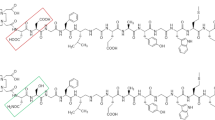Abstract.
The outstanding sensitivity of pentagastrin in detecting the presence of primary, recurrent or metastatic medullary thyroid cancer (MTC) suggests widespread expression of the corresponding receptor type in human MTC. Indeed, recent autoradiographic studies have demonstrated the presence of cholecystokinin (CCK)-B (= gastrin) receptors not only in more than 90% of MTCs but also in a high percentage of small cell lung cancers, stromal ovarian cancers, astrocytomas and several other tumour types. The aim of this study was to evaluate whether radiolabelled gastrin may be suitable for targeting CCK-B receptor-expressing tumours in vivo. For this purpose, the biodistribution of the radioiodinated human heptadecapeptide gastrin-I was studied in nude mice bearing subcutaneous xenografts of the human MTC cell line, TT. Initial therapy experiments were undertaken. Finally, the biodistribution of iodine-131- labelled gastrin-I was studied in a patient with metastatic MTC. At a peptide amount of approximately 1 μg, maximum tumour uptake (8.9±2.9%ID/g) was observed in animals at 1 h post injection, with tumour-to-blood ratios as high as 6.3±1.9. Physiological CCK-B receptors in the stomach, gallbladder and pancreas of the mice were targeted as well. The major route of excretion was renal, but strong evidence for a biliary excretion pathway also exists. Pilot therapy studies with 131I-labelled gastrin showed significant anti-tumour efficacy as compared with untreated controls. In accordance with the preclinical data, good receptor targeting was observed in the tumour sites, stomach, gallbladder and pancreas of a patient with metastatic MTC. These data suggest that gastrin and its analogues may represent a useful new class of receptor binding peptides for diagnosis and therapy of a variety of tumour types, including MTC and small cell lung cancer. Future preclinical and clinical studies will address in more detail the molecular features that render CCK-B receptor binding agents potentially useful candidates for in vivo scintigraphy and radionuclide therapy.
Similar content being viewed by others
Author information
Authors and Affiliations
Additional information
Received 19 December 1997 and in revised form 6 January 1998
Rights and permissions
About this article
Cite this article
Behr, T., Jenner, N., Radetzky, S. et al. Targeting of cholecystokinin-B/gastrin receptors in vivo: preclinical and initial clinical evaluation of the diagnostic and therapeutic potential of radiolabelled gastrin. Eur J Nucl Med 25, 424–430 (1998). https://doi.org/10.1007/s002590050241
Issue Date:
DOI: https://doi.org/10.1007/s002590050241




